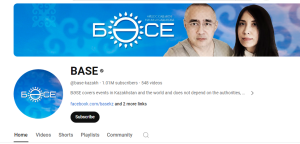On June 18, Kazakh opposition activist and journalist Aidos Sadyqov was shot in the head by an attacker while sitting in a parked car with his wife, fellow journalist Natalya Sadyqova, in the Ukrainian capital, Kyiv.
The Sadyqovs moved to Ukraine in 2014, seeking asylum, after authorities in the Kazakh city of Aktobe opened a criminal slander case against Sadyqova, who wrote for the opposition newspaper Respublika, which was banned in 2012 but persisted through years of being hounded by the then-Nursultan Nazarbayev government. Sadyqov had his own long history as an opposition activist and journalist that additionally prompted their flight from the country.
After being granted refugee status in Ukraine, the Sadyqovs launched a YouTube-based media channel, Base, which produces content in Kazakh and Russian. (They also run a Telegram channel with the same name).
In October 2023, the Sadyqovs were placed on a wanted list in Kazakhstan on charges of “inciting hatred.” They dismissed the allegations as politically motivated an vowed to continue their work.
On June 19, Sadyqova told RFE/RL that shortly before the attack on her husband, they’d published a new video alleging that Kazakh President Kassym-Jomart Tokayev had become a puppet of the Russian government. She also told media that they had received repeated threats due to their coverage of political issues in Kazakhstan.
This history forms the backdrop of the attempted murder of Sadyqov and heightens attention on how Kazakhstan responds to the investigation and Ukrainian requests. Astana has strived to remain balanced in its approach to the Russia-Ukraine war and the wider geopolitical battle between Russia and the West and remains sensitive to accusations like those made by the Sadyqovs that it is little more than a Russian puppet.
A week after the attack, Sadyqov remains hospitalized and in serious condition, and Ukrainian authorities are reportedly preparing an extradition request for two suspects, Kazakh nationals Altai Zhaqanbaev and Meiram Qarataev.
Ukrainian National Police said in a June 21 statement that the two suspects entered Ukraine via Poland on June 2. They rented an apartment, bought a car, and surveilled Sadyqov’s movements until June 18 when one of the men shot Sadyqov while the other watched. The two then left Ukraine via the Moldovan border.
Zhaqanbaev was arrested on June 22 after turning himself in to Kazakh authorities. Sadyqova alleged that the second suspect, Qarataev, was a police officer in Kazakhstan’s northern Kostanay Region; Kazakhstan’s Interior Ministry issued a statement claiming that Qarataev had been “dismissed from the organs attached to the ministry in January 2019 and currently is not a police officer.”
Kazakhstan’s Prosecutor-General’s Office said it was trying to determine the whereabouts of Qarataev.
A spokesman for Tokayev said that the president “had ordered law enforcement entities to find the two suspects’ whereabouts and undertake corresponding measures.”
“Kazakhstan’s side is ready to cooperate with Ukraine’s law enforcement structures, including via Interpol,” spokesman Berik Uali said on June 21.
On June 26, Kazakh Deputy Interior Minister Marat Qozhaev told RFE/RL that Kazakhstan would “proceed in accordance with the law” if Ukrainian authorities made an extradition request, but declined to comment further.
How Kazakhstan ultimately responds to the coming Ukrainian extradition request will be read like tea leaves. The two suspects appeared to have orchestrated a professional-style hit on a critical journalist; the question is why, and many will ask, on whose behest and to what end?

































